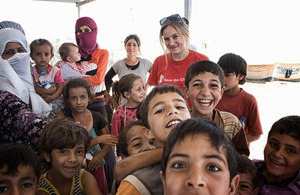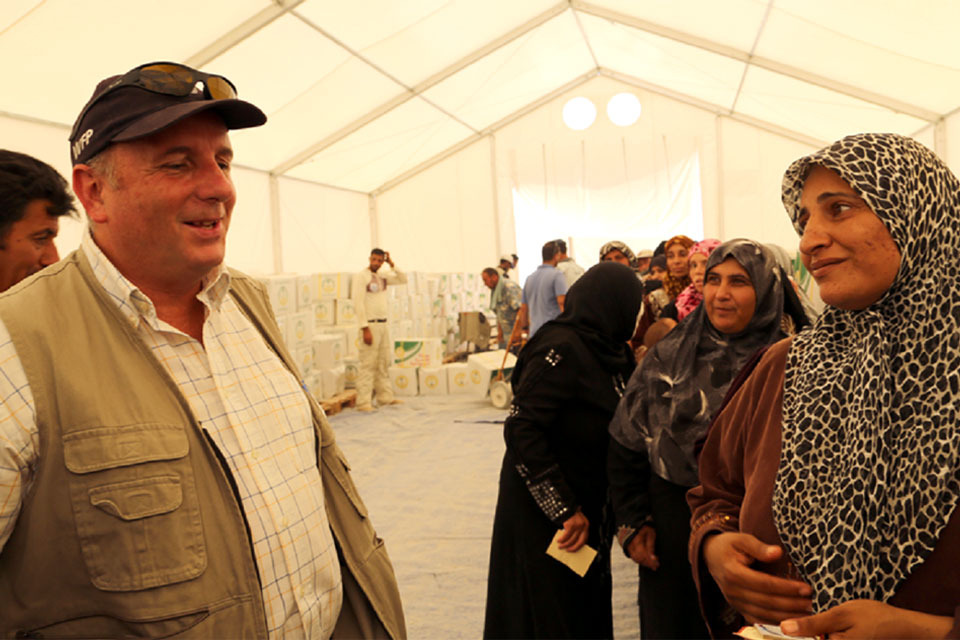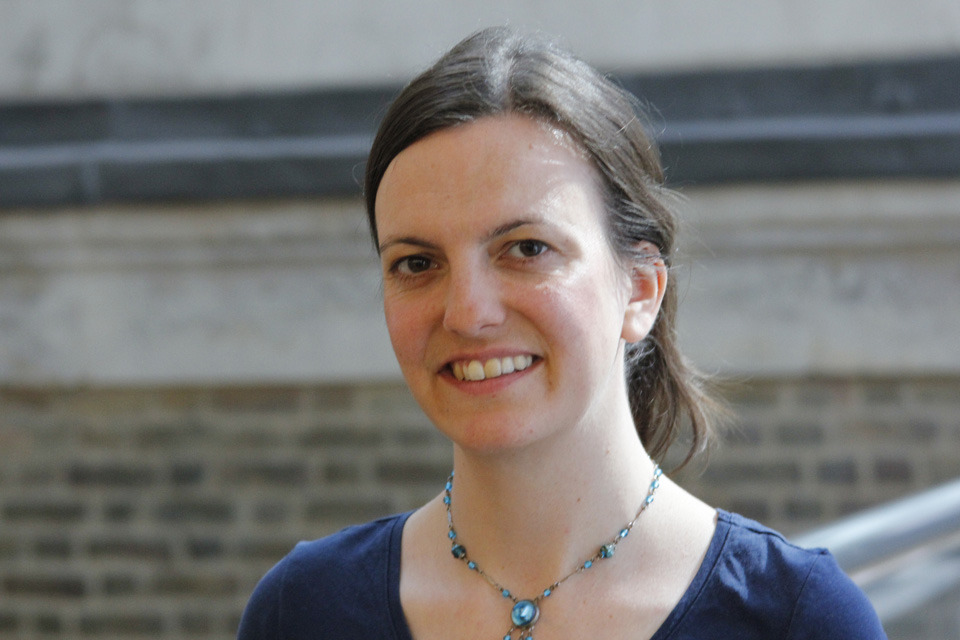World Humanitarian Day 2013
A time to remember and honour humanitarian aid workers who have lost their lives while trying to help people in need around the world.

Save the Children's Katie Seaborne is based in northern Iraq where she is working on supporting Syrian refugees. Picture: Save the Children
World Humanitarian Day is an annual event designated by the UN General Assembly to coincide with the anniversary of the 2003 bombing of the United Nations headquarters in Baghdad, which killed 22 UN staff. It is a time to recognise those who face danger and adversity in order to help others.
The Department for International Development (DFID) leads the UK government’s response to humanitarian emergencies in developing countries. We deploy our own staff to areas affected by humanitarian emergencies when necessary, and support the work of aid agencies such as the World Food Programme and non-governmental organisations (NGOs) like Save the Children.
This year the UN and its humanitarian partners are launching a ground-breaking campaign called The world needs more… with the aim of turning words into real aid for real people.
See also
-
Press Release: Greening urges UK to back ‘unsung heroes’ of aid
-
Policy: Helping developing countries deal with humanitarian emergencies
This World Humanitarian Day, to say ‘thank you’, we’re profiling just some of the British humanitarian workers who are helping those affected by the conflict in Syria.
Katie Seaborne: A view from Save the Children in Iraq
Katie Seaborne has been working for Save the Children for over 2 years – of which 18 months have been on the front line in programmes around the world: in Niger, Senegal, Mali, the Democratic Republic of Congo and now Iraq, where she is supporting Save the Children’s Syrian refugee response. She is now in her second month of work in northern Iraq, helping to support the increasing needs of over 160,000 Syrian refugees who have flooded into the country.
“The humanitarian community is saving lives and supporting recovery and we are very grateful for people’s generosity, worldwide, in funding the work. People in the UK should feel proud of their support to the families who have had their lives torn apart by the devastating conflict that is raging in Syria”, says Katie.
“On World Humanitarian Day this year I think the world needs more front-line health workers to tackle the nearly 11 million preventable child deaths that occur every year.”
Read more about Katie in our World Humanitarian Day gallery on Flickr.
Jonathan Campbell: Helping Syrian refugees in Jordan

Jonathan Campbell oversees the World Food Programme’s humanitarian projects assisting Syrian refugees in Jordan. Picture:World Food Programme
Jonathan Campbell is the Emergency Coordinator for the World Food Programme (WFP) in Jordan. He oversees WFP’s humanitarian projects, assisting Syrian refugees in Jordan living in the camps and in Jordanian communities.
A long-term WFP staff member, Jonathan has worked predominantly on emergencies around the world, from the aftermath of the 2004 tsunami that struck Sri Lanka and the conflict there in 2009, to the response to the Libya crisis in 2011 and the deteriorating food security situation in Yemen.
“Since 2001 I’ve worked for WFP on humanitarian emergencies around the world, helping to make sure that people affected by conflict or disaster have enough to eat”, says Jonathan.
“It’s great that World Humanitarian Day thanks us for the work that we do, but this year the message is also that ‘the world needs more’. I’d say the ‘world needs more food in the right places’.
“Part of my job is to get food to people who need it, wherever they happen to be.
“There’s enough food in the world to feed everyone, but right now we’re focusing on making sure the hundreds of thousands of people who’ve been forced to flee the conflict in Syria can meet their food needs. The conditions are harsh and the needs are great.”
Read more about Jonathan in our World Humanitarian Day gallery on Flickr.
Louisa Medhurst, DFID humanitarian advisor in Lebanon

DFID Humanitarian advisor, Louisa Medhurst. Picture: DFID
Louisa Medhurst works as a humanitarian adviser for DFID. She is based in Beirut, Lebanon, from where she builds up a picture of the humanitarian situation in Syria to advise what the UK’s humanitarian response to it should be. This enables UK support though international humanitarian organisations to provide assistance including food, water and medical supplies to those in need inside Syria.
Louisa studied International Relations and Peace Studies and then Law with Human Rights at university. Since then, she’s worked all over the world, helping deliver aid and coordinating humanitarian responses throughout Asia, Africa and the Middle East.
“It is all worthwhile and very rewarding when we see the results of our work and when you see aid reach and help people who are suffering”, says Louisa of the work she does.
Get involved
Get involved in World Humanitarian Day this year. Look for #TheWorldNeedsMore on twitter and retweet what you think the world needs more of. Or you can tweet #WHDthankyou to show your support, or like and share our posts on Facebook